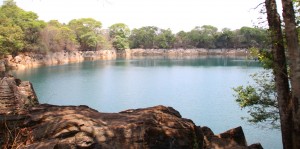Shadow depends on light, and light can penetrate the darkness.
There was a time in my life when, as a young adult, I read mostly horror novels and sought out horror movies. Darkness characterised most of these: we got midnight terror, lightless cellars, clouds drifting across the moon at the precise moment the graveyard begins to stir. The movies were frequently frustrating to me, just because I couldn’t see what was happening.
All very scream-inducingly terrifying, but gradually I realised that unease felt in a brightly lit landscape could be a lot creepier. I remember a sun-drenched early movie version of Stephen King’s short story Children of the Corn, and too the subtle escalation of apprehension in Peter Weir’s exquisite heat-hazed Picnic at Hanging Rock, with something or nothing always just beyond the edge of sight.
I have felt that same unease under a bright blue sky, walking in a sun-bleached sweep of veld not far from Johannesburg.
I always felt that if ever I turned to writing creepy, I must remember that Africa especially lends itself to creepiness in sunshine.
Chimamanda Adichie has talked of ‘the danger of a single story’, and for many, even today, Africa the Dark Continent is that single story. When I was invited to contribute a story to African Monsters, I knew I wanted to write one with sunlight in it, although not necessarily without shadow.
Ichitapa was the most seductive of the African monsters I researched. The Ndola sunken lakes in Zambia, with their pristine water brilliantly lit by the African sun, were ideal, surrounded by the shadowy mushitu forest, dark yet admitting sufficient light in places for shadows to be cast. Together, they fired my imagination, and my story Severed is the result.

Light begets shadow, and our shadows seem to be an intrinsic part of us. In some cultures, not only in Africa, and especially in earlier times, they could represent the soul, or even the darkness that exists in us all. We can speculate as to what sort of meaning JM Barrie attached to the human shadow. Peter Pan loses his shadow, and he desperately wants it back to play with, so that he can be ‘real’. Wendy sews it back on, perhaps recognising its significance as an essential part of the boy, giving him humanity.
Without our shadows, we are incomplete, so if you ever visit the Ndola sunken lakes, be careful not to let your shadow fall on the water. You don’t know what might happen.
